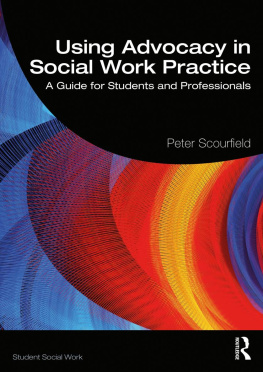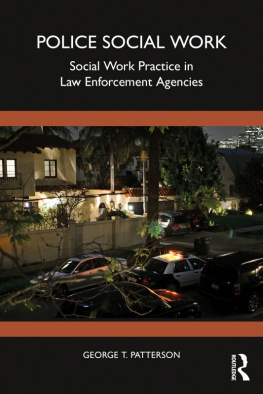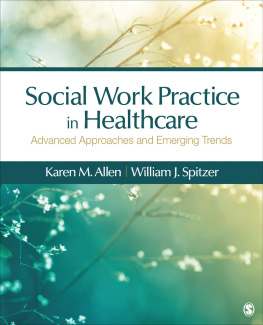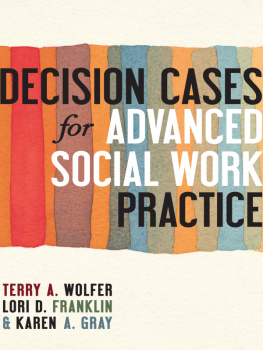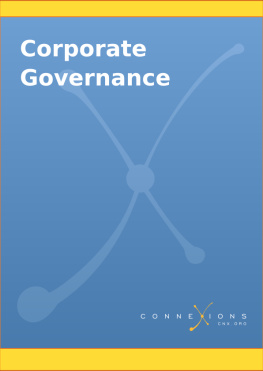Wendy Bowles is Senior Lecturer in Social Work at Charles Sturt University and co-author of Research for Social Workers (Allen & Unwin/ Routledge). She has served on the National Ethics Committee of the Australian Association of Social Workers.
Michael Collingridge is Professor and Head of the School of Humanities and Social Sciences at Charles Sturt University, and has taught and researched in professional ethics and law for many years.
Steven Curry is Research Fellow at the Centre for Applied Philosophy and Public Ethics, University of Melbourne, and has worked with government and professional organisations on issues of ethics and professional practice.
Bruce Valentine is Lecturer in Social Work at Charles Sturt University and has extensive experience in the fields of health and welfare.
Practice in Society series
Series editor: Jan Fook, University of Southampton
Ethical Practice in Social Work is the first title in the Practice in Society series. This new series is designed to showcase writing about innovative approaches to social and community service work that is research-based and directly applicable to professional practice.
Forthcoming are titles on the following topics: mental health in social work practice, pastoral care in health settings, spirituality in human service work.
Ethical practice in social work
AN APPLIED APPROACH
Wendy Bowles
Michael Collingridge
Steven Curry
Bruce Valentine
First published 2006 by Allen & Unwin
Published 2020 by Routledge
2 Park Square, Milton Park, Abingdon, Oxon OX14 4RN
605 Third Avenue, New York, NY 10017
Routledge is an imprint of the Taylor & Francis Group, an informa business
Copyright Wendy Bowles, Michael Collingridge, Steven Curry and Bruce Valentine
All rights reserved. No part of this book may be reprinted or reproduced or utilised in any form or by any electronic, mechanical, or other means, now known or hereafter invented, including photocopying and recording, or in any information storage or retrieval system, without permission in writing from the publishers.
Notice:
Product or corporate names may be trademarks or registered trademarks, and are used only for identification and explanation without intent to infringe.
The Cataloguing-in-Publication entry is available from the National Library of Australia
Typeset in 11/14 ACaslon by Midland Typesetters, Victoria
ISBN-13: 9781741146820 (pbk)
This book started out as a conversation between two of us (Wendy Bowles and Michael Collingridge). A new way of thinking about ethical social work practice was emerging from our teaching at Charles Sturt University and the workshops we conducted with practitioners in different organisations and several countries. Initially referred to as power ethics, we later abandoned this term in favour of a more applied approach but we retained our central argument that being ethically articulate empowers practitioners. At Charles Sturt we are fortunate in being able to teach professional ethics as an exchange, and sometimes an argument, between philosophers and practitioners/academics. Many of the philosophers who have taught with us in ethics also work in the universitys Centre for Applied Philosophy and Public Ethics in Canberra.
Our social work ethics classes have been enlivened by three of the authors (Wendy, Michael and Steve Curry) working through their ideas with the social work students, many of whom bring with them a wealth of practice and life experience. The fourth author (Bruce Valentine), became involved in the project firstly as a PhD student researching social justice, then as an academic. He brings a lifetime of professional practice and management experience in the human services. As a student text, we had in mind that it might be used by social work students and their lecturers in the later part of their social work programs when the students have some understanding of the nature of social work and social work practice.
This book is a conversation between four different voices from three different professions: social work, law and philosophy. Each of us have different styles and idiosyncrasies. The book represents our collective view about the power of ethics in professional life.
Though each chapter usually had a primary author, we all contributed to, worried over and edited each one and thus we all share the responsibility for what you are about to read. Thinking back on the process of writing the book we realise that we applied the themes we advocate. The book also illustrates the strength of four very different perspectives working togetheran example of our argument for a pluralist approach to ethical practice. We remain good friends and colleagues.
Too many people have contributed to this book for all to be acknowledged individually. The case studies represent an amalgam of stories, anecdotes, experiences and even jokes that we began collecting many years ago. Some social workers offered cases and asked that they be disguised to protect the parties involved, while others contributed through their previously published accounts, which we have acknowledged in the text. To all those people who wittingly and unwittingly contributed, we express our thanks.
Professor Seumas Miller, Director of the Centre for Applied Philosophy and Public Ethics, encouraged us to write this book and cracked the whip. Others wed like to thank include Bill Anscombe, Marianne Bush, Professor Richard Hugman and our colleagues and students in the School of Humanities and Social Sciencesthey all helped us formulate our ideas over the years.
Thanks also to Lesley Chenoweth and Donna McAuliffe for permission to reproduce the diagram of An inclusive model of ethical decision making that we discuss in .
Finally a special thanks to Professor Jan Fook, the series editor, Elizabeth Weiss, our publisher, and Alexandra Nahlous, our editor at Allen & Unwin, for their patience and detailed advice. Ethical practice in social work requires practitioners to take an ethical position including accepting responsibility for their practice. As authors, all errors are ours.
Every effort has been made to contact the copyright holders of material used. Please contact the publisher directly for any copyright enquiries.
Ethics is an integral part of the working life of every social and other human service worker. Making decisions in situations where there is no simple right or wrong solution, working between people and organisations, advocating for those who cannot advocate for themselves, having to justify your actions to people who are questioning why something was done or not donethese are just some of the daily challenges social workers encounter. Faced with complex situations and conflicting interests, and arguing for different courses of action, social workers need a solid base of ethical understanding and decision-making ability if they are to make a difference to other peoples lives, and personally thrive in their own jobs.
In this book we argue that not only is ethics fundamental to social work, it is a source of empowerment for social workers. Many people, social workers in particular, feel uneasy about terms such as power and empowerment being associated with ethics. Power, especially unchecked power, is usually associated with being unethical. We think of dictators doing terrible things to people, or faceless bureaucrats making unethical decisions, hidden away from anyone who could hold them accountable for their actions. Social work itself has had some bad moments in its history when it has acted as a tool of the state to oppress disadvantaged groups. Images of social workers removing babies without good reason, or abusing their power in other ways, are all too familiar. Power has always had a contradictory place in the social work profession. Radical social workers of the 1970s and more recently the critical approaches since the mid-1990s have called on social workers to confront issues of power. But how?



